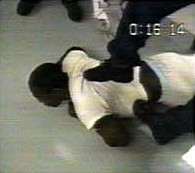Feature:
Prison
Rape:
The
Stories
Need
to
Be
Told
4/15/2005
Update: Drug War Chronicle feature story on this topic published 3/23/07, available online here. special to Drug War Chronicle by Andrea Cavanaugh, public outreach associate for Stop Prison Rape Troy Bishop had no idea how much grief a small amount of cocaine could bring him when he was arrested in Texas 12 years ago. Because he was considered a "habitual offender," the four-fifths of a gram of powdered cocaine he was carrying netted Bishop a 25-year prison sentence. He thought things couldn't get any worse, but he was wrong. Soon after he was imprisoned, he was brutally raped by a prison gang member. Bishop, a slender man who stands 5 feet, 8 inches tall, was unable to defend himself. In an effort to protect himself, he made a homemade knife seven years ago and was placed in administrative segregation. Since then, Bishop has broken the rules again and again so he can remain in his single-man cell, away from prison predators.
Unfortunately, Bishop's case is far from unusual. Often unfamiliar with prison life, nonviolent drug offenders are among those at highest risk for prisoner rape. And America's prisons are bulging with prisoners of the "War on Drugs" -- one in four state prison inmates and nearly three in five federal prisoners are serving time on drug charges, according to the Bureau of Justice Statistics. America's incarceration frenzy is at an all-time high. More than two million people are imprisoned in this country at any given time. According to the Department of Justice, one in 15 Americans will serve time in prison at some time in their lives. For men of color, the odds are even greater -- one in ten Latinos and one in three black men will serve time. Many corrections officials maintain that prisoner rape is a rare occurrence, but research shows otherwise. Although prisoner rape is a subject that has been virtually ignored by scientists -- a researcher in 1992 found only a dozen studies on the subject -- those who have delved into the problem have found that a pervasive culture of sexual violence governs many US prisons and jails. Research on Midwestern prisons conducted by social scientist Cindy Struckman-Johnson of the University of South Dakota in 1996 is the most comprehensive research to date on prisoner rape. After surveying 1,800 inmates, Struckman-Johnson found that one in five male prisoners has been coerced or pressured into sex, and one in ten has been raped. In one women's prison, more than a quarter of the inmates said they had been pressured into sex by guards, Struckman-Johnson found. Sexual abuse of prisoners is America's most neglected and most shameful human rights crisis. Although many Americans would like the problem of custodial rape to remain behind prison walls, its effects ripple outward into our communities. More than 95% of all prisoners eventually are released. Rates of HIV are more than three times higher inside prison than on the outside. Many prisoner rape survivors suffer from depression, post-traumatic stress disorder, and other psychological problems, and carry the spiraling culture of violence they learned behind bars into our communities. Stop Prisoner Rape (SPR), a national human rights organization dedicated to eliminating sexual violence against men, women, and youth behind bars, is embarking on a groundbreaking project that will focus on those whose voices are rarely heard -- the prisoners themselves. "Stories from Inside" will highlight firsthand accounts of nonviolent drug offenders who have endured sexual abuse in custody. The project will shatter stereotypes about prisoner rape and the public's perception that drug offenders "get what they deserve" while incarcerated. By telling their stories, survivors will help the public to see the human cost of the war on drugs and three-strikes laws -- people like Troy Bishop, who may live for decades in virtual solitary confinement in order to avoid horrific sexual brutality. Years after he was raped, Bishop is still haunted by the violent attack he suffered at the hands of another inmate. "Is this justice?" Bishop wrote to SPR from his prison cell. "I have awful dreams. How I only wish I could somehow totally forget the rape. I am willing to do anything I can to prevent others from becoming victims of rape in prison." For more information or to participate in "Stories from the Inside," contact Andrea Cavanaugh at 3325 Wilshire Blvd. Suite 340, Los Angeles CA 90010, 213/384-1400 x106, or [email protected], or visit the Stop Prisoner Rape web site.
|

